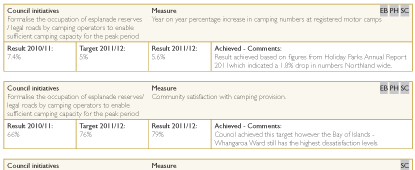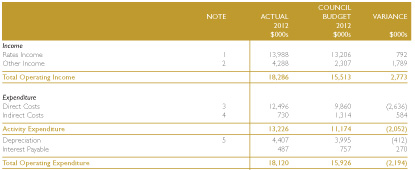At a Glance
Primary Services
- Motor Camps
Why We Do It
The high market value of coastal land makes it unprofitable for private enterprise to retain coastal property as camp grounds. Council's ownership of camp grounds ensures camping holidays are an option for residents and visitors. Council owns and leases for a commercial return camp grounds at Russell, Tauranga Bay and Houhora Heads. As a response to the growing demand for freedom camping and to comply with the requirements of the Freedom Camping Act 2011, Council has set aside some sites in remote areas that permit overnight camping for self contained camping vehicles. It is still Council's policy that for the protection of the environment and for visitor's personal safety they should stay in a registered camp ground.What Has Changed Since The LTCCP 2009/19?
Council has adopted an amended Reserves Bylaw that allows Council, by public notice, to set aside areas for camping for certified camping vehicles within the district. Central government developed the Freedom Camping Act 2011 which provides transitional powers for managing freedom camping during the RWC 2011.Priorities For 2011/12 |
What We Have / Haven't Achieved |
|---|---|
| Continuing to update the camping information pamphlet and promote licensed camping grounds within the district | Council has achieved this priority and has up dated the camping brochure and it is available on line and at service centres and i-SITES. |
| Working with Community Boards to determine what reserves, if any, should be set aside for use by self contained camping vehicles and developing a Freedom Camping policy in time for RWC visitors | Council has achieved this priority and has worked closely with community boards to determine what freedom camping opportunities should be provided for the RWC 2011 in their wards. Council has also adopted a freedom camping policy. |
| Continuing to monitor the provision of camping on the west coast of the district | Council has continued to monitor the camping opportunities on the west coast of the district. |
| Continuing to review the provision of camping at the peak period between December and January | Council has continued to work collaboratively with Holiday Parks New Zealand (HAPNZ) to monitor camping provision over the peak season. |
| Continuing to monitor illegal camping in known hot spots during the peak camping period | Monitoring the illegal hot spots during the peak camping periods continues to be a challenge for Council. |
| In line with Council's policy continue to improve coastal access as part of any coastal resource consent approved | Council has had limited opportunities to improve coastal access as part of any resource consent approved over the last year. |
Future Issues / Challenges |
Implications |
|---|---|
| Managing the demand from New Zealand Motor Caravan Association (NZMCA) for freedom camping sites | There is a growing number of grey nomads who wish to travel around New Zealand and enjoy our beaches, forests and lakes. They are proactively advocating for more freedom camping sites to be opened for self contained camping vehicles. However, as more sites are available it becomes harder to ensure visitors with non self contained vehicles are aware that they should stay at a camp ground. |
| Ensuring that Council does not create behaviour that has a negative effect on the economic viability of the district's camp ground operators while ensuring the district is still welcoming to visitors in camping vehicles |
There is a growing trend towards the use of camping vehicles by visitors to New Zealand. Many of these vehicles are not self contained and can have a negative effect on our environment. The New Zealand Camping Forum is working to improve the negative effects of this industry. Council is seeking to create a policy that will control over night camping and support camp ground operators. |
| Ensuring rent levels for lessee of motor camps does not drive up the fee structure so that visitor numbers decline | Council wants to receive a fair return on its coastal land without driving up the fee structure for campers beyond the market rate. |
Highlights of Performance

TPM = Total number of Performance Measures
 Performance 2010/11 vs. 2011/12 - has improved
Performance 2010/11 vs. 2011/12 - has improved
Statement of Service Performance
For MOTOR CAMPS the following pages detail:- Service performance information provides levels of service comparative results for 2010/11 and 2011/12 including achievements and issues.
- Financial performance including comparisons against budget 2011/12.
 Print the above sections
Print the above sections

